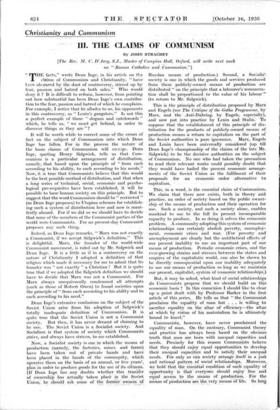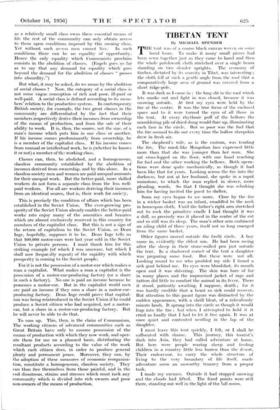III. THE CLAIMS OF COMMUNISM
Christianity and Communism
[The Rev. M. C. D'Arcy, S.J., Master of Campion Hall, Oxford, will write next week on "Roman Catholics and. -Communism."} "TfI1E facts," wrote Dean Inge, in his article on the claims of ConimuniSm and Christianity, "have heen ObFeured by the dust of controversy, stirred up by fear, passion and hatred on both sides." Who would deny it ? It is-difficult to refrain, however, from pointing out how substantial has been Dean Inge's own contribu- tion to the fears passion and hatred of which he complains. For example, I notice that he alludes to us, his opponents in this controversy, as "Lenin's gangsters." Is not this a perfect example of .those "slogans and catchwords" ,which, he tells us, "we must get behind, in order to discover things as they are " ?
It will be worth while to correct some of the errors Of fact on the subject of Communism into which Dean Inge has fallen. For in the process the nature of•the basic claims of Communism will emerge. Dean Inge, quoting Henry' Sidgwick, tells us that Com- munism is a particular arrangement of distribution, namely, that based- upon the -principle of "from each according to his ability, to each according to his needs:" Now, it is true that communists believe that this would be the best possible method of distribution, and that when a long series of technical, social, economic and psycho- logical pre-requisites have been established; it will be possible to base human society on this principle. But to suggest that the word!Communism should be" restricted" (as Dean Inge proposes) to.Utopian schemes for establish- ing such a system of- distribution here and now is mani- festly absurd.' For if we.did so we should-have to decide that none of the members of the Communist parties of the world were Communists. For no present-day Communist proposes any such thing.
Indeed, as Dean Inge remarks, "Marx Was not exactly a Communist, if we accept Sidgwick's definition." This is delightful. Marx, the founder of the world-wide Communist movement, is ruled out by Mr. Sidgwick and Dean Inge. -It is a little as if in a controversy on the nature of Christianity F adopted a definition of that religion which made it necessary for me to admit that Its founder was "not exactly" a Christian ! But it is quite true that if we adopted the Sidgwick definition we should have to decide that Marx was not a Communist. For Marx always unequivocally condemned all attempts (such as those of Robert Owen) to found societies upon the principle of" from each according to his ability and to each according to his need."
Dean Inge's extensive confusions on the subject of the Soviet Union arise from his adoption of Sidgwick's totally inadequate definition or; communism. It is quite true that the Soviet Union is not a Communist society. But then, it has never dreamt Of claiming to be one. The Soviet Union is a Socialist society: And Socialism- iS that system of society which Communists strive; and always have striven, to see established.
• Now, a Socialist society is one in which the means of production • (namely, the factories, mines and farms) have been taken out of private hands and have been placed in the hands of the community, which Operates them On the basis of an annual, or five years', plan in Order to produce goods for the use Of its citizens. (If Dean Inge has any doubts whether this tran'ifer of ownership has actually taken phi& in the Soviet Union.; he should ask some of the former owners Of Russlrin means of production.) Second, a Socialist society is one in which the goods and services produced from these publicly-owned.: means of production - are distributed "on the principle that a labourer's -remunera- tion shall be proportioned to the value of his labour" (to return to Mr. Sidgwick).
This is the principle of distribution proposed by Marx and Engels (see The Critique of the Gotha Programme; by Marx, and the ' Anti,Diihring, by Engels, especially, and' now put into practice'by Lenin and • Stalin: -To suppose that the establishment of this principle of dis- tribution for the products of publicly-owned means of production means a- return to capitalism on the part of the Soviet authorities is pure ignorance. Marx, Engels and Lenin have been universally considered (up till Dean Inge's championship of the claims of the late Mr. Sidgwick) to be the- decisive authorities on the subjeCt of Communism. No one who had taken the precaution to read their relevant works could possibly . doubt that they would have hailed the present- economic arrange- ments of the Soviet Union as the fulfilment, of their proposals for an economic order . alternative to capitalism. - This, in a word, is the essential claim of Conimunisin. We claim that there now exists, both iii' theory' arid practice, an order of society based on the public owner- ship of the means of production and their operation for use. Such a society, and such a society alone, enables mankind to use to the full its present incomparable capacity to produce. In so doing it solves the economic problem. A community adopting this system of economic relationships can certainly abolish poverty, unemploy- ment, economic crises and war. (For poverty .and unemployment are clearly but the antithetical effects of our present inability to use an important part of our means of production. Periodic economic crises, and the ever-growing strains and stresses between the states and empires of the capitalistic world, can also be shown tto be directly consequential upon our inability adequately to' tise our means of production so long as We Maintain our present, capitalist, system of economic relationships') But, it may, be asked, what kind of social. relationships do Communists propose that we should build on this economic basis ? In this connexion I should like to clear up a point dealt with by Professor Barker_ in the _first article of this peries.. He tells us that the Communist- proclaims the equality of man but _. . . is , willing to sacrifice equality on the altar of efficiency—the altar at which by :virtue of his materialism he is ultimately bound to kneel."
Communists, however, have never proclaimed the equality of man. On the contrary, Communist theory and practice has always been based on, the , obvious truth that men are born with unequal capacities and needs. Precisely for this reason Communists believe that they should enjoy _equal opportunities to develop their unequal capacities and to satisfy, their unequal needs. For only ,so can society arrange itself in a just and 'rational "pattern of social relationships. Moreover, We hold that the essential condition of such equality of - . - . opportunity is that - everyone should enjoy free and primal access to the 'means of .produetion. For the Means of production are the very means of life. So long as a relatively small class owns these essential means of life the rest of the community can only obtain access to them upon conditions imposed by --this owning class. Yet without such access men cannot live. In such conditions there can be no equality of opporfunit■ Hence the only equality which Communists proclaim consists in the abolition of classes. (Engels goes sLo far as to say that any demand for equality which - goes beyond the demand for the abolition of classes "passes into absurdity.") But what, it may be asked, do we mean by the abolition of social classes ? Now, the category of a social class is not some vague conception of rich and poor, ill-paid or well-paid. A social class is defined according to its mem- bers' relation to the productive system. In contemporary British society, for example, the two great classes in the community are . differentiated by the fact that their members respectively derive their incomes from ownership of the means of production, and from the sale of their ability to work. It is, then, the source, not the size, of a man's income which puts him in one class or another. If his income comes predominantly from ownership, he is a member of the capitalist class. If his income comes from manual or intellectual work, he is (whether he knows it or not) a member of the working class.
Classes can, then, be abolished, and a homogeneous, classless community established by the abolition of incomes derived from ownership, and by this alone. In a classless society men and women are paid unequal amounts for their unequal work. But the better-paid, more skilled workers do not form a separate class from the less well- paid workers. For all are workers deriving their incomes from an identical source, that is, their work for society.
This is precisely the condition of affairs which has been established in the Soviet Union. The ever-growing pro- sperityof the Soviet Union already enables the better-paid worke rsto enjoy many of the amenities and luxuries which are almost exclusively reserved in this country for members of the capitalist class. But this is not a sign of the return of capitalism to the Soviet Union, as Dean Inge, hopefully, supposes it to be. Dean Inge tells us that 100,000 motor-cars were last year sold in the Soviet Union to private persons. I must thank him for this striking example (of which I was unaware, but which I shall now frequeatly repeat) of the rapidity with which prosperity is- coming to the Soviet people.
For it is not the possession of a motor-car which makes a man a capitalist. What makes a man a capitalist is the possession of a motor-car-producing factory (or a share in such a factory). No one is paid an income because he possesses a motor-car. But in the capitalist world men are paid an income if they own a share in a motor-ear- producing factory. Dean Inge could prove that capital- ism was being reintroduced in the Soviet Union if he could produce a Soviet citizen who had acquired, not a motor- car, but a share in a motor-car-producing factory. But he will never be able to do that.
• To sum up. This, then, is the claim of Communism. The working citizens of advanced communities such as Great Britain have only to assume possession of the means of production with which they now work, and oper- ate them for use on' a planned basis, distributing the resultant products according to the value of the work which each citizen does, in order to produce general plenty and permanent peace. Moreover, they can, by the adoption of these measures of economic reorganisa- tion, constitute a honiogeneous, classless society. They can thus free themselves from those painful, and in the end disastrous, strains and stresses which must rack any community which is divided into rich owners and poor non-owners of the means of production.





















































 Previous page
Previous page